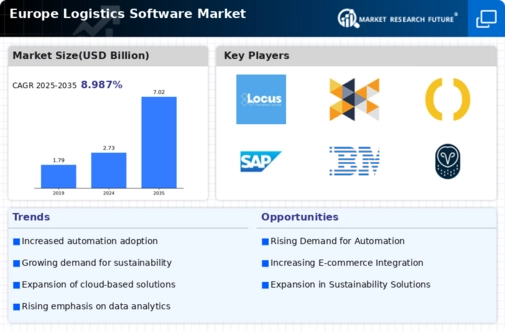E-commerce Growth
The surge in e-commerce activities across Europe is a pivotal driver for the Global Europe Logistics Software Market Industry. As online shopping continues to gain traction, logistics software is essential for managing complex supply chains and ensuring timely deliveries. The increasing consumer expectation for fast and reliable shipping services necessitates advanced logistics solutions. This trend is likely to contribute to the market's growth, with projections indicating a rise to 541.32 USD Billion by 2035. Companies are investing in logistics software to streamline operations and enhance customer satisfaction, thus capitalizing on the booming e-commerce sector.
Global Trade Dynamics
The evolving landscape of global trade significantly impacts the Global Europe Logistics Software Market Industry. Trade agreements and geopolitical shifts can alter supply chain routes and logistics strategies. As businesses expand their operations internationally, they require robust logistics software to navigate complex customs regulations and optimize cross-border transportation. The increasing interconnectivity of global markets necessitates software solutions that can provide real-time data and analytics for informed decision-making. This dynamic environment is likely to propel the market forward, as companies seek to enhance their logistics capabilities in response to changing trade dynamics.
Regulatory Compliance
Regulatory compliance remains a critical factor influencing the Global Europe Logistics Software Market Industry. As governments implement stringent regulations regarding transportation, safety, and environmental standards, logistics software becomes indispensable for ensuring adherence. Companies are utilizing software solutions to automate compliance processes, reducing the risk of penalties and enhancing operational transparency. The emphasis on sustainability and eco-friendly practices further drives the demand for logistics software that can track emissions and optimize resource usage. This focus on compliance is expected to bolster market growth as organizations strive to meet regulatory requirements efficiently.
Technological Advancements
The Global Europe Logistics Software Market Industry is experiencing rapid technological advancements that enhance operational efficiency. Innovations such as artificial intelligence, machine learning, and the Internet of Things are being integrated into logistics software solutions. These technologies facilitate real-time tracking, predictive analytics, and automated decision-making processes. For instance, companies are leveraging AI to optimize route planning, which can lead to significant cost savings. As a result, the market is projected to reach 235.94 USD Billion in 2024, indicating a strong demand for sophisticated logistics solutions that can adapt to evolving industry needs.
Demand for Supply Chain Visibility
The demand for enhanced supply chain visibility is a driving force in the Global Europe Logistics Software Market Industry. Companies are increasingly recognizing the importance of transparency in their supply chains to mitigate risks and improve operational efficiency. Logistics software that offers real-time tracking and data analytics enables organizations to monitor their inventory levels, shipment statuses, and potential disruptions. This heightened visibility allows for proactive decision-making and better customer service. As businesses strive for greater efficiency and responsiveness, the market is expected to grow, reflecting the critical need for advanced logistics solutions.























